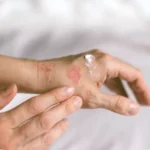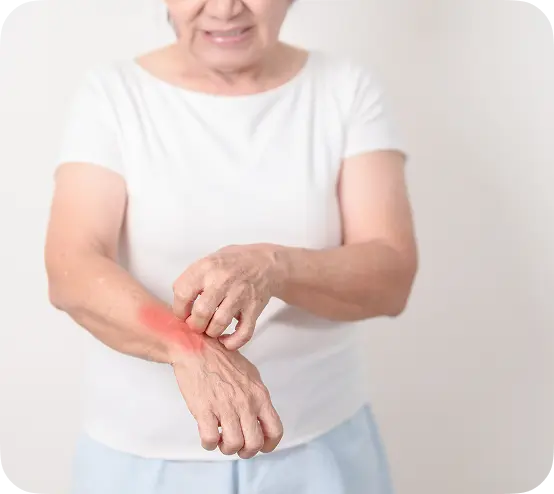
Seborrheic Dermatitis
8 October 2025
Eczema
8 October 2025Psoriasis
Psoriasis is a chronic skin disease characterized by redness, scaling, and itching on the skin. Psoriasis can be controlled with modern dermatology methods. With expert support, symptoms are reduced, and the quality of life increases.

Psoriasis Treatment
Psoriasis is a chronic skin disease that occurs as a result of the rapid proliferation of skin cells due to the overactivity of the immune system. Redness, scaling, thick plaques, and itching are the most common symptoms. Although it is a chronic disease, it can be controlled with modern treatment methods.
Psoriasis Symptoms
- Red and inflamed plaques on the skin
- White-silver scaling
- Itching and sometimes pain
- Thickening, pitting, and color changes in the nails
- Joint pain (Psoriatic arthritis)
Psoriasis Causes
Although the exact cause of psoriasis is unknown, the most important factors are:
- Genetic predisposition: Family history of psoriasis
- Immune system: Autoimmune mechanisms
- Stress: One of the most important triggers of flare-ups
- Infections: May occur, especially after throat infections
- Smoking and alcohol use
- Climate and environmental factors
Types of Psoriasis
- Plaque-type psoriasis (the most common form)
- Guttate psoriasis
- Inverse psoriasis (in areas such as the armpits, groin)
- Pustular psoriasis
- Erythrodermic psoriasis (widespread and severe form)
Psoriasis Treatment Methods
- Topical TreatmentsCorticosteroid creams, Vitamin D analogues, and moisturizers are the first-step treatments for reducing plaques.
- Phototherapy (Light Therapy)Narrowband UVB phototherapy is an effective treatment method for psoriasis. Skin improvement is achieved with regular sessions.
- Systemic DrugsImmunosuppressive drugs used orally or by injection are preferred in moderate and severe cases of psoriasis.
- Biologic DrugsBiologic treatments developed in recent years target the immune system and provide effective results for psoriasis.
- Lifestyle AdjustmentsAvoiding stress, eating healthy, and abstaining from alcohol and smoking support the treatment.
Is Psoriasis Contagious?
Psoriasis is not contagious. It is not possible for the disease to pass from person to person.
Frequently Asked Questions
Does psoriasis completely heal?
It is a chronic disease and may not completely disappear. However, symptoms can be controlled with proper treatment.
Is psoriasis triggered by stress?
Yes, stress is the most common trigger for psoriasis.
Which doctor should be seen for psoriasis?
A dermatology specialist should be consulted for psoriasis treatment.
Psoriasis Treatment at Our Clinic
Personalized approaches are applied for psoriasis treatment at our clinic. We ensure the reduction of your complaints with phototherapy, biologic drugs, and supportive care protocols. Our goal is to enhance your quality of life and protect your skin health.
You can book an appointment now to get support from our dermatology specialist for psoriasis treatment and bring your complaints under control.
